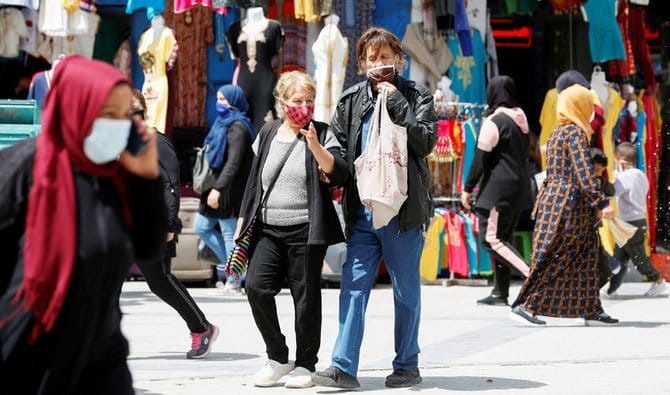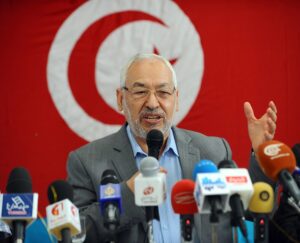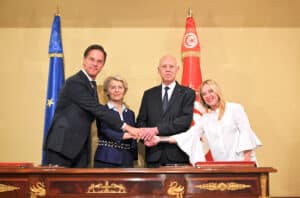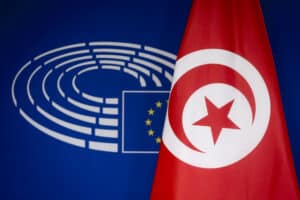People wearing protective face masks in Tunis (Image by Reuters)
The International Monetary Fund (IMF) is ready to help Tunisia with an aid package to deal with the current financial crisis, an IMF official said last Thursday, 6th of May. However, there is “no timeline” for finalising an agreement, spokesperson Gerry Rice told reporters. Rice did not provide details on the size of the loan program under discussion, but said, “we stand ready to support Tunisia and the Tunisian people to cope with the impact of the crisis, and move forward to an inclusive job-rich recovery and restore sustainable finances.”
It is the fourth time in a decade the heavily indebted country has turned to the IMF for help, and Tunis is reportedly seeking a three-year loan deal. Tunisia’s economy has experienced crisis after crisis since the country’s 2011 revolution.
Covid-19
The country’s economy was already in crisis before, but this has been exacerbated by the coronavirus pandemic. As recently as last Friday, May 7th, Prime Minister Hichem Mechichi said that Tunisia was going through “the worst health crisis in its history.” On Sunday, the country started another week of coronavirus restrictions. Mosques, markets and non-essential shops must close, gatherings and family or cultural celebrations are banned, and people are forbidden from travelling between regions. An overnight curfew begins at 7pm and is in force until 5am.
The Mediterranean country, with a population of around 12 million, has recorded more than 300,000 coronavirus cases and over 11,200 deaths. Medics in Tunisia are stretched to the limit, with around 100 people a day dying of COVID-19 and more than 500 people currently in intensive care – unprecedented numbers that have required medics to set up field hospitals.
Measures to curb the spread of the virus, including the temporary closure of all borders last year, have had disastrous effects on an already unstable economy. The confinement and shutdown of entire sectors such as the tourism industry – a cornerstone of the country’s economy – are among the factors which have caused the economy to shrink by an unprecedented 8.8 percent last year. Tunisia’s current budget has a deficit of 18.5 billion dinar (6.7 billion dollars) and is likely to increase, according to preliminary estimates. Unemployment remains at around 16 per cent in Tunisia.
Political infighting
Tunisia’s divided politicians have so far been unable to act decisively to free the country from its economic predicament. Characterized by infighting, Tunisia’s fractured parliament and leadership are not able to rectify decades of economic mismanagement and the coronavirus pandemic. In January, frustration at the government’s inability to tackle Tunisia’s economic and social crisis exploded into protests, with a police crackdown following.
The President and Prime Minister Mechichi also remain in a stand-off about issues such as security. Besides, in the relatively short life of the current parliament, the President has refused to swear in four of Mechichi’s proposed ministers, citing conflicts of interest.
In a recent poll, more than 70 per cent of respondents refused to back any political party, showing the wide political disillusionment among the Tunisian people.
Reform plan
Tunisia’s unending political paralysis limits any leverage that the country may wield in negotiations with global actors such as the IMF, and hinders decisive political actions. However, parliamentarians said on Wednesday 5th of May that there is an almost unanimous agreement in the ruling coalition to allow Prime Minister Mechichi allow him to govern by decree-laws. The goal is to facilitate the Premier’s task in fighting the COVID-19 pandemic and the economic and social crisis of the country.
The government presented the IMF with a reform plan which includes a proposal to slash the public sector workforce, which has swelled due to hiring in the health sector aimed at fighting the pandemic. Public wages will be cut down to 15 percent of gross domestic product (GDP) in 2022, compared to 17.4 percent last year, the documents show, in addition to a freeze on salary increases in 2021.
The Tunisian people have more than once displayed their objection to such measures, for example during the anti-austerity protests of 2018. While the IMF expects the measures will see the country experience GDP growth of 3.8% this year, the question remains how the reforms will be received by an already frustrated and disillusioned electorate.
JordanTimes, TheNationalNews, LibyanExpress, TheArabWeekly, ArabNews, AlAwsat, OpenDemocracy, TAP1, TAP2, AlJazeera



